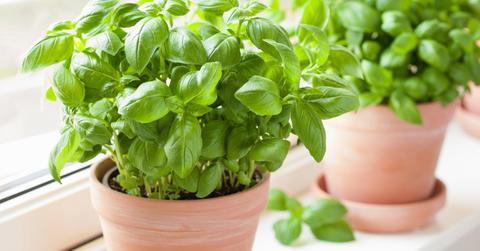These Plants Will Stop Mosquitoes From Bugging You This Summer
Plants are a good way to naturally deter mosquitoes — without any additional waste, to boot.
Updated June 13 2019, 10:02 a.m. ET

Forget the bug repellants, pest control sprays, and even candles that claim to rid mosquitoes with Citronella. All of these mosquito-fighting options are loaded with nasty additives, harmful fragrances, synthetic compounds, and dangerous chemicals.
Take DEET for example, one of the most well-known components of bug spray: It’s efficient in repelling mosquitoes, ticks, fleas, and any other bugs that bite. But it doesn’t come without its drawbacks; many complain that DEET irritates their skin or that the smell ignites allergies. A 2009 study found that DEET interferes with the activity of enzymes vital for the nervous system to function properly.
Not to mention, each of these toxin- and chemical-laden mosquito repellents comes in single-use plastic packaging. Whether it’s one-time use wipes or a plastic bottle (that often isn’t even recyclable), these options are not only bad for your health, but because they’re packaged in plastic, they’re bad for the environment, too.
Luckily, there are so many zero-waste ways to repel mosquitoes and other bite-happy bugs. Keep reading for zero-waste ways to use plants to repel mosquitoes!
Lemon balm
Lemon balm promotes a healthy relationship to bugs. It brings in the right ones — pollinators like bees and butterflies — and deters mosquitoes. Mosquitoes don’t like the smell of lemon balm and so generally stay away from it. Remember though, lemon balm attracts bees and butterflies, so it might be a smart rule of thumb to keep these plants away from your entryway.
Basil
There are so many zero-waste uses for basil around the house — treating acne and relieving headaches are just two—but did you know that basil also effectively wards off mosquitoes? Basil leaves contain an oil called estragole that’s toxic to mosquito larvae. The best place to plant basil is near a water source. It will control the mosquito population in the vicinity and deter mosquitoes from laying eggs.
Peppermint
The oil in peppermint plants is called Mentha piperita, and like the oil in basil, has anti-larvicidal properties. One study in which mosquito larvae were exposed to the oil resulted in a 100 percent mortality rate for the larvae. Planting peppermint around the yard will work well, but if you need more immediate backup, you can crush up the peppermint leaves in your hands to release a strong scent.
Catnip
It attracts cats and repels mosquitoes — what’s not to love? Catnip contains the essential oil nepetalactone, which was found in one study to be more effective at repelling mosquitoes than even DEET. Nepetalactone repels mosquitos 10 times more efficiently than DEET because it takes one-tenth as much to have the same result.
Lavender
Humans may love lavender for its many health benefits — and hey, it just smells good! — but mosquitoes are not privy to the sweetness of lavender. In fact, the odor actually repels mosquitoes, making it a must-have near the entryways of your home or any other yard spaces that people frequently inhabit. In addition to planting lavender to ward off blood-suckers, you can also mix lavender essential oil with a few others (like peppermint!), and apply it to your skin.
Citronella
Perhaps you’ve heard of Citronella before; most people reach for Citronella candles before turning to essential oils, plants, and other zero-waste ways to combat bugs. But natural Citronella is far more effective than the chemical- and additive-filled candles found at the dollar store. Citronella itself rarely poses a risk to humans (though the smoke can be harmful to pets and the candle itself is toxic if ingested by pets). It’s the stuff mixed in with the Citronella in the candle that you have to worry about. In grass form, Citronella — which is a type of lemongrass — does wonders for repelling mosquitoes. You can even crush the leaves and rub on your skin for a natural repellent.
Rosemary
Like many of the other plants on this list, the essential oil of rosemary is not a smell that mosquitoes particularly love. In fact, it’s the scent that keeps mosquitos steering clear. Plant some rosemary outdoors near a patio or outdoor deck area or boil a cup of dried rosemary with a quart of water for 20 to 30 minutes. Strain the water into a container, then pour it into individual amber glass spray bottles. Apply directly to skin to use as an immediate mosquito repellent!